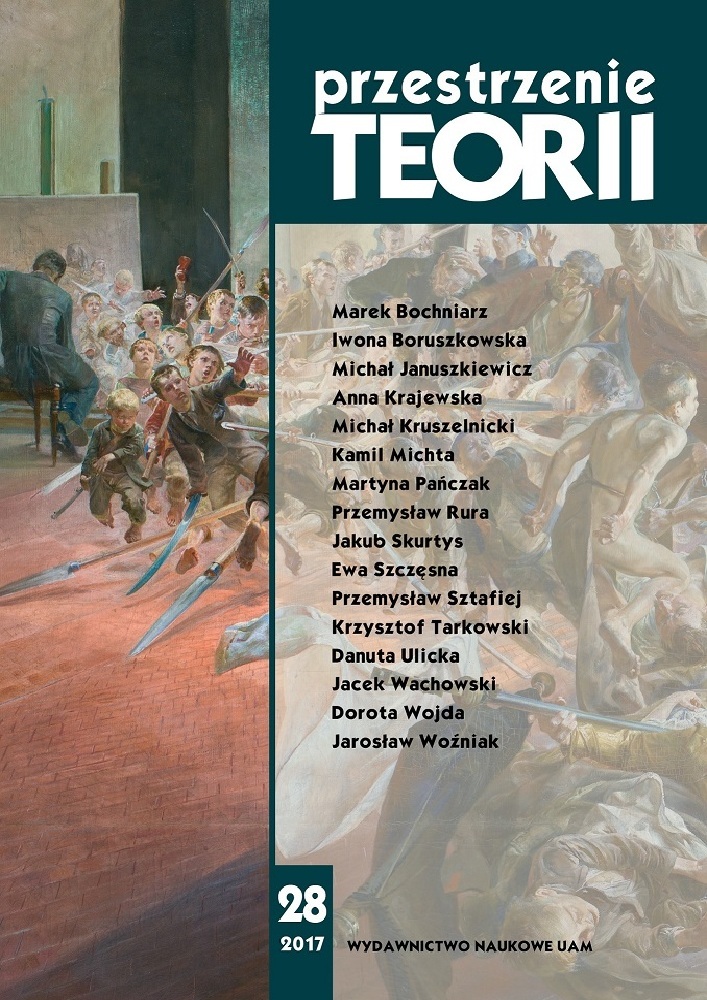Abstrakt
The article discusses zoomorphism as part of the anthropocentric discourse aimed at establishing human dominance over animals. Basing on Jacques Derrida’s 1997 paper “The Animal That Therefore I Am (More to Follow),” the article approaches anthropomorphism and zoomorphism as culturally sanctioned ways of misrepresenting animality and shaping human attitudes towards real-life animals. A symptom of the misrepresentation is the gap between animals and their linguistic denotations. The specific aim of the article is to demonstrate that zoomorphism as used in everyday language conserves the human-centered vision of the world by ignoring the differences between individual animals. The discussion concludes by arguing that zoomorphism can be remedied by the individualizing aspects of anthropomorphism.
Bibliografia
Baker S., Picturing the Beast: Animals, Identity and Representation, Manchester 1993.
Derrida J., The Animal That Therefore I Am (More to Follow), “Critical Inquiry” Winter 2002, no. 2.
Derrida J., “Eating Well,” or the Calculation of the Subject: An interview with Jacques
Derrida, [in:] Who Comes After the Subject?, ed. E. Cadava, P. Connor and J-L Nancy, New York and London 1991.
Derrida J., Of Spirit: Heidegger and the Question, trans. G. Bennington, R. Bowlby, Chicago and London 1989.
Francione G., Animals, Property, and the Law, Philadelphia 1995.
Garrard G., Ecocriticism, London and New York 2012.
Grandin T., Johnson C., Animals in Translation: The Woman Who Thinks Like a Cow, London 2005.
Leahy M., Against Liberation: Putting Animals in Perspective, London 1994.
Midgley M., Animals and Why They Matter, Athens, GA 1983.
Morton T., The Ecological Thought, London 2010.
Nussbaum M., Frontiers of Justice: Disability, Nationality, Species Membership, Cambridge, MA and London 2006.
Regan T., The Case for Animal Rights, Berkeley and Los Angeles 1983.
Rowlands M., Animal Rights. A Philosophical Defense, New York 1998.
Singer P., Animal Liberation, New York 1990.
Willis R.G., Man and Beast, London 1974.
Wilson E.O., Sociobiology: The New Synthesis, London 2000.
Wolfe C., Animal Rites: American Culture, the Discourse of Species, and Posthumanist Theory, Chicago 2003.
Young K.E., Beastly Politics: Derrida, Animals, and the Political Economy of Meat, “Spectra: The Aspect Journal” 2015, no. 2, <https://spectrajournal.org/SPECTRA/article/view/240/168> [accessed 10.08.2016].
Licencja
Autorzy
Autorzy tekstów przyjętych do publikacji w czasopiśmie „Przestrzeniach Teorii” są zobowiązani do wypełnienia, podpisania i odesłania na adres redakcji umowy o udzielenie nieodpłatnej licencji do utworów, z zobowiązaniem do udzielania sublicencji CC.
Zgodnie z umową, autorzy tekstów opublikowanych w czasopiśmie „Przestrzeniach Teorii” udzielają Uniwersytetowi im. Adama Mickiewicza w Poznaniu niewyłącznej i nieodpłatnej licencji oraz zezwalą na użycie sublicencji Creative Commons Attribution-NonCommercial-NoDerivatives 4.0 International (CC BY-NC-ND 4.0).
Autorzy zachowują prawa do dalszego, swobodnego rozporządzania utworem.
Autorzy, którzy wykorzystują w swoim tekście cudze utwory (np. ilustracje, fotografie) proszeni są o dostarczenie do redakcji czasopisma zgodę na publikację od uprawnionych podmiotów.
Użytkownicy
Zainteresowani użytkownicy internetu uprawnieni są do korzystania z utworów opublikowanych po 2015 roku „Przestrzeniach Teorii” tylko w calach niekomercyjnych, pod następującymi warunkami:
- uznanie autorstwa - obowiązek podania wraz z rozpowszechnionym utworem, informacji, o autorstwie, tytule, źródle (odnośniki do oryginalnego utworu, DOI) oraz samej licencji;
- bez tworzenia utworów zależnych - utwór musi być zachowany w oryginalnej postaci, nie można bez zgody twórcy rozpowszechniać np. tłumaczeń, opracowań.
Do wszystkich tekstów opublikowanych przed 2015 r. prawa autorskie są zastrzeżone.
Inne
Uniwersytet im. Adama Mickiewicza w Poznaniu zachowuje prawo do czasopisma jako całości (układ, forma graficzna, tytuł, projekt okładki, logo itp.).
